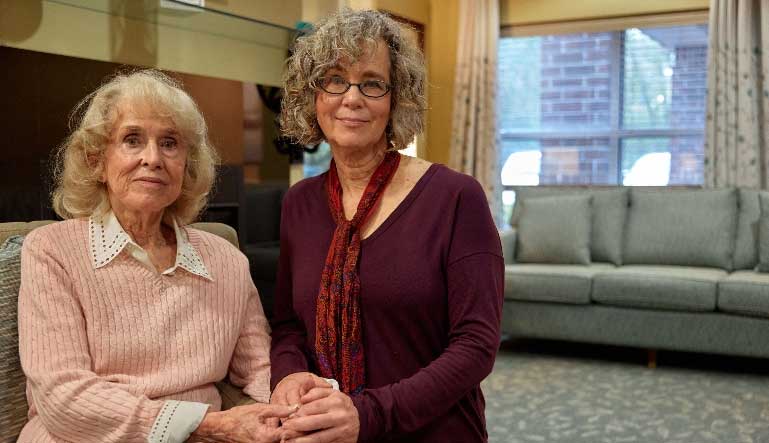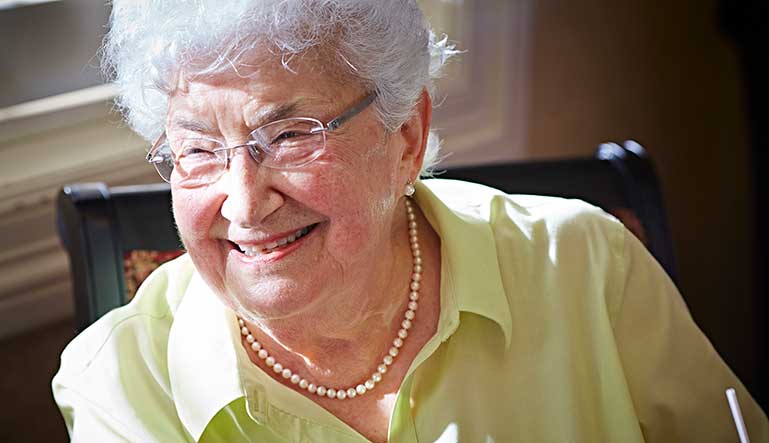In assisted living, you receive personalized help with activities of daily living (ADLs) like bathing or showering, getting dressed, getting in and out of a bed or chair, walking, using the bathroom, and eating, while still living independently. In some assisted living communities, additional services like transportation, house chores, property maintenance, and medication monitoring may also be available.
Table of Contents
The Value of Assisted Living
Assisted living communities offer a great value because they typically include many services, amenities, and benefits wrapped up in one cost-effective package. You get to remove everyday burdens so you can spend your time playing cards with friends, take that art class you’ve always been interested in, or enjoy spending more time with your family.
Assisted Living Promotes Independence
One big misunderstanding about assisted living is that older adults who choose this option will lose their independence. In reality, residents who choose assisted living are free to create their own schedules and have time to participate in enriching activities. Assisted living helps out only where and when you need it.
How Does Assisted Living Work?
Assisted living works the way you want it to. In general, assisted living residents enjoy access to support services and medical care when needed in a home-like atmosphere that promotes as much independence as possible. There are all kinds of amenities and services in assisted living that vary from community to community. In addition to assistance with mobility and personal care, assisted living services may also include things like helping with housekeeping, medication management, apartment maintenance and utilities, wellness checks, and transportation to and from appointments or errands.
Beyond individualized support services, there are plenty of other amenities to foster independence and wellbeing like social activities with other residents, fitness classes, top-notch dining, and easy access to medical resources to put residents and their loved ones’ minds at ease.
What are typical Assisted Living Accommodations? Is there privacy?
There are all kinds of assisted living communities offering different types of living arrangements. The most common assisted living accommodations are private apartments and suites. As for privacy, there are plenty of ways to enjoy the company of other residents, but private rooms are standard.
What is a Typical Day Like in an Assisted Living Community?
Each day at an assisted living community is different, but a typical day for an assisted living resident might start with having a team member assist them with getting ready for the day. They may then head down to breakfast in the dining room, and then join a community outing to shop downtown. Later, they might meet up with their card club to play a few hands or enjoy dinner with friends in the dining room. In the evening, a team member will assist them in settling in for the night. It’s all about what works best for you.
How to Know when Assisted Living is Needed
If you find that you or a loved one is having more accidents or falls at home, personal care and grooming is becoming more challenging, if you are experiencing difficulty managing your medications on your own, or if housekeeping chores have become too much, then assisted living might be right for you.
Assisted living is best for someone who needs some services to help enhance their independence. If more serious medical care or 24-hour supervision is needed, then assisted living might not the right option for you or your loved one and you may need a full-service nursing home.
Seniors who can perform ADLs without any assistance may be better suited for independent living communities. Many of the great benefits of assisted living are still available in independent living communities including social activities, housekeeping, local transportation and dining. Memory Care is another assisted living option best suited for seniors with Alzheimer’s and other forms of dementia.
What are the Benefits of Assisted Living?
Assisted living residents get to enjoy amenities and services like:
- Private rooms with living areas, kitchens or kitchenettes and en-suite bathrooms
- Restaurant-style dining
- Local transportation
- Enriching activities
- Group outings
- On-site wellness programs and classes
- Ability to relax and pursue all your favorite passions and hobbies
- Emergency call systems for help in a crisis
- Peace of mind for you and your family knowing you’re in a safe and caring environment
- Help with activities of daily living (ADLs)
- Cost savings – assisted living is not as expensive as memory care or nursing homes
And of course, the biggest benefit of assisted living is personalized care—it meets you where you are. You get to dictate your schedule and participate in all the fun activities your community has to offer while assisted living staff give you extra support in the areas where you need it.
What Does Assisted Living Cost?
Assisted living is a convenient package option for seniors with value far beyond the dollar amount.
According to Genworth Financial, the average cost of assisted living in 2023 was $5,350 per month. Compared to the average monthly household expenses plus the addition of home aide and home maintenance / care services, and other incidentals such as groceries and transportation—the costs can really add up.
What’s included in the price of assisted living?
Assisted living costs include chef-prepared meals each day, maintenance-free living, on-site enrichment and wellness activities, transportation, and much more. Assisted living also includes things for which a monetary value can’t be assigned – building relationships with fellow residents, maintaining the power of choice over schedules and activities, and enjoying the peace of mind in knowing that home maintenance is cared for and medical help is readily available if needed.
Assisted Living vs. Other Senior Care Options
What’s the difference between assisted living and a nursing home?
Often misunderstood, assisted living communities and nursing homes are very different.
The goal of assisted living is to give some support to residents while they still live independently. Residents in assisted living often enjoy their own apartments that have a homey design and feel.
Nursing homes, on the other hand, provide 24/7 care for residents that typically live with more complex health conditions. The settings are typically in a more clinical environment with shared and private rooms that do not include living areas or kitchenettes.
Nursing homes typically cost significantly more than assisted living communities due to the higher level of care they provide. Genworth Financial reports that in 2023, the average assisted living community cost $64,000/year while a private room in a nursing home cost $116,800.
Assisted living vs. Home Care – Which is Better?
Assisted living is best if you want to be surrounded by a community of other residents, have services catered to your needs, and have a team of staff around you for support. Home care is the right choice if you prefer to stay in the comfort of your home, but this can come with drawbacks. Relying on home care limits social engagement and can contribute to feelings of isolation or boredom. Choosing home care instead of assisted living also means there may be no one here in the event of a medical emergency. With assisted living, accommodations are built in for mobility concerns, whereas it can be difficult and costly to retrofit a house.
With home care, you receive one-on-one care and companionship at set intervals. With assisted living, personalized care is spread across a team of staff members instead of a single individual, ensuring that you’ll always have the care you need when you need it.
What to Look for in an Assisted Living Community
When it comes to choosing the right assisted living community it’s important to look at communities that can provide the right service for your needs. While the bells and whistles of chandeliers and large fireplaces are definitely things you can enjoy, they won’t take care of you. Instead, focus on skilled staff, dining services, activity calendars, and cleanliness.
How to Smoothly Transition a Loved One into Assisted Living
How to talk to a loved one about moving to assisted living
Whether your loved one approaches you or you approach them, talking about a move to assisted living can bring up lots of emotions. The common misconception is that residents lose their independence, so finding ways to emphasize independence and enrichment are key.
When talking to a loved one about moving to assisted living, discuss every detail, even the things that may seem trivial. Your parent or loved one may be feeling anxious about the big change that comes from moving to an assisted living community. It’s best to broach the subject with compassion and an open mind. Avoid using phrases like “you have to move” and “you need to sell your home.” Let your loved one in on the decision making process from choosing a community to what type of activities they want to join.
Visit the Assisted Living Community
You and your loved one can prepare for this new chapter by touring assisted living communities. Meet the staff, chat with other residents, and encourage your loved one to ask as many questions as they want.
Create a Transition Timeline
Moving can be a lot for anyone to manage. There’s precious items to be boxed up, closets to be cleaned out, and moving companies to be hired. Creating a timeline can help make the process a little less stressful. Start with an eight-week timeline focused on packing supplies, moving company quotes, and talking with staff at your assisted living destination. From there break down each week and set goals on what you want to accomplish for your senior family member.
Decorate to your Heart’s Content
Assisted living is all about empowering residents to be independent while making them feel comfortable. This new space is a new home, enjoy the furnishing and decorating process. Set up family photos, hang favorite pieces of artwork, and let your loved one surround themselves with the same items they have at home. This can be especially important for seniors with dementia. Filling a loved one’s space with familiar objects can help ease stress and reduce anxiety.
Spend Time with your Senior Family Member
Plan to spend move-in day with your loved one. Help them set up their new home, walk the property together, check out some of the activities together, and get a bite to eat together in the dining room.
Find an Assisted Living Community Near You
Your assisted living community is also your new home, which means the environment should be suited to you. Whether that’s palm trees and an ocean breeze, a view of the mountains, or the familiar surroundings of your local community, Five Star Senior Living’s got you covered.
Research communities online, book a community tour, or try before you buy with a short term or respite stay. Still have questions? Contact us today and a member of our knowledgeable and friendly staff will be happy to help you find the perfect assisted living community for you.
Contact Us Today



![How Much Does Assisted Living Cost? [2025]](https://www.fivestarseniorliving.com/wp-content/uploads/2022/07/cost-of-assisted-living-blog-hero.jpg?ver=1710517178)





